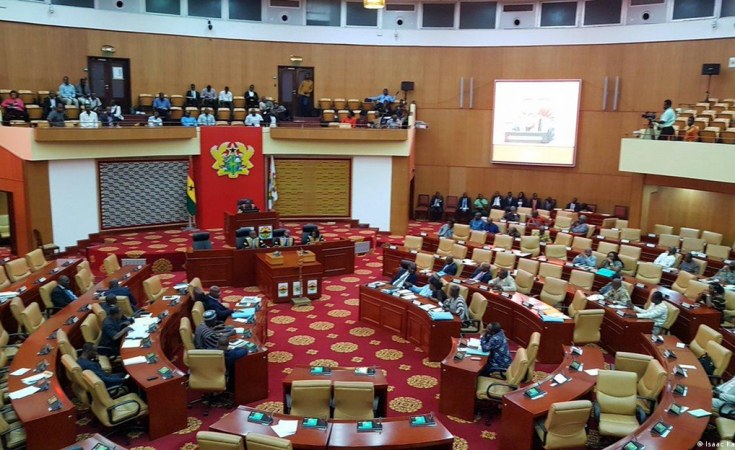The anti-LGBTQ+ bill is yet to be signed into law by Ghana's president but many LGBTQ+ people already feel threatened. Human rights groups say the bill has far-reaching implications for other minority groups.
Breaking down in tears, musician Angel Maxine, who identifies as a queer Ghanaian, told DW that she fears for her life after Ghana's parliament voted to pass a controversial anti-LGBTQ law.
Maxine was one of the activists that had pushed for the bill's rejection when it was sent to parliament in 2021, but she said that now all hope is lost.
"I am sad because we have been working all these years for this bill not to be passed," Maxine told DW from Ghana's capital Accra.
It has taken Ghana's parliament three years to get this bill passed with the aim to clamp down on the rights of LGBTQ people in the country.
The "Human Sexual Rights and Family Values" bill imposes a jail term of up to three years on persons who identify as LGBTQ and engage in same-sex relationships and sexual activities.
It also imposes a prison sentence of up to five years for the "wilful promotion, sponsorship, or support of LGBTQ+ activities."
Those convicted with the promotion and funding of LGBTQ+ related activities could face up to a decade in prison.
Losing the battle for recognition
Maxine said this is bad for her community and friends who have been fighting for recognition and respect for their sexuality for years.
"If not for anything queer people should not be crimnalized. We should be given the freedom to live, like any other human being, like any other ghanaian," she said. "It breaks my heart that this bill is passed."
Ghana is a conservative society and homosexuality is considered taboo -- a sentiment that is fueled by religious and cultural beliefs. That has meant the new law has received a lot of support from the majority of Ghanaians.
This is evident in the unanimous passage from lawmakers on Wednesday who enjoyed the backing of a coalition of Christian, Muslim, and Ghanaian traditional leaders.
The main sponsor of the bill, opposition lawmaker Sam George, told reporters that Ghana's President Nana Akufo-Addo must not delay in signing the bill into law.
"There is nothing that deals with LGBTQ better than this bill that has been passed by parliament," George said. "We expect the president to walk his talk and be a man of his words."
Will Ghana's president sign the bill?
All eyes are now on Akufo-Addo who has yet to confirm whether or not will sign the bill into law.
Last year he refused to sign some human rights related bills citing that they had not been initiated by the government and had some cost implications for the state.
He said the consitution gives him the option to reject private members bills that exert some financial burden on the state.
The anti-LGBTQ bill could also be considered to exert a financial burden on the state.
Human rights groups in Ghana -- including an umbrella group of lawyers and human rights activists known as the "Big 18" -- have asked the president not to sign the bill.
"You cannot criminalize a person's identity and that's what the bill is doing and it's absolutely wrong," Professor Takyiwaa Manuh, a member of the coalition said. "We want to impress on the president not to assent to the bill, it totally violates the human rights of the LGBT community."
Professor Audrey Gadzekpo, a rights activist with the Center for Democratic Development in Accra, said the lawmakers rejected all suggestions made during their delibration depsite the implications of passing the bill for minority groups in the country.
"We are sought of disappointed that parliament didn't take it seriously. We know that there is a lot of pressure within parliament because of the way the issue was framed. So even those who know the dangers of the bill couldn't come out against the bill," she said.
Gadzekpo said none of the suggestions from the human rights community were considered.
Global condemnation
The United States has also criticized Ghana's passage of the bill.
Matthew Miller, spokesperson for the US Department of State said in a statement that the United States is "deeply troubled by the Ghanaian Parliament's passage of legislation, officially called the Human Sexual Rights and Family Values Bill."
"The bill would also undermine Ghana's valuable public health, media and civic spaces, and economy. International business coalitions have already stated that such discrimination in Ghana would harm business and economic growth in the country," Miller said.
UNAIDS executive director Winnie Byanyima said the bill is a barrier to ending AIDS.
"If it becomes law, it will obstruct access to life-saving services, undercut social protection, and jeopardize Ghana's development success," she said in a statement.
Rose Konadu an entrepreneur in Accra told DW she worries the reaction greeting the bill from the international community would harm Ghana's image.
"A bill like this has a negative and positive side. The negative side being that it would affect Ghana interms of finance and other things from other countries," Konadu said although she believes in the bill and feels homosexuality is "morally wrong."
Other Ghanaians like Cyril Anani, a civil servant, told DW that the lawmakers did exactly what Ghanaians wanted when they passed the bill into law.
"I think the passage of the anti-LGBTQ bill is just in the right direction because when you look at the public popular opinion of people it is that we don't want it in our country so I think parliament has just done what the people of Ghana want," he said.
Same-sex ^sexual intercourse in Ghana was already punishable by up to three years in prison, but while discrimination against LGBTQ people is common, no one has ever been prosecuted under the colonial-era law.
Edited by: Keith Walker


